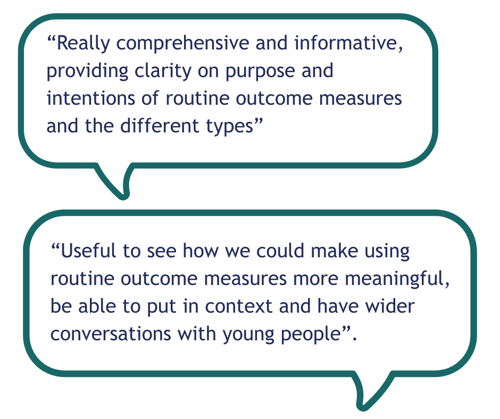Reflecting on members’ meaningful use of CORC support this past year
As we approach the end of our membership year (April 2024 to March 2025), our Regional Officers Lee Atkins and Rachael Grant reflect on their work with members during this time, the types of work undertaken, and the impact this has had for their services. These organisations consulted with CORC to build the meaningful use of evidence and to focus on improvement in their systems and processes to improve the mental health and wellbeing support they provide for children and young people.
Members make great use of the free CORC training available to foster improved understanding, engagement, relevance and use of outcome and feedback measures. The number of member services attending our training has grown again this year, providing opportunities for colleagues from different sectors and places across the UK and beyond to learn and develop good practice. CORC wholeheartedly recommend this is offer is shared widely within all member organisations, as is of great value, to staff new to outcome measures as well as those who want to improve their use. Both Rachael and Lee deliver these different webinars and always welcome the interaction and feedback, so these are as beneficial for your work as possible.

We have recently provided more tailored staff development support to members such as Barnardo’s and Unlocking Potential. CORC facilitated, or co-facilitated staff development workshops to build skills and confidence with the effective use of measures. Our tailored training includes a focus on questions and themes raised by staff regarding outcome measures within their particular service. CORC work with services to help them understand the needs of their staff. For example, completing the CORC Staff Practice and Attitudes survey supported Manchester University NHS Foundation Trust to identify what is working well and plan for staff development based on need.
Supporting services to select outcome measurement tools appropriate to their service is an important part of our work with members, and is frequently what brings our members to CORC. CORC worked closely with voluntary sector organisation too. When Green Hub for Teens joined CORC, Rachael visited their service to support staff to develop their theory of change and identify key outcomes to measure. Merseyside Youth Association were beginning to gather data on the resilience of young people in their locality and received guidance and support from the team about what to collect and how to implement this.
One of the most popular areas of support provided by the CORC team has always been the analysis of outcomes change data and providing a report detailing the findings, and this continues to be valued by members. We also work with services to guide their own data analysis and interpretation. For example, the CORC data team provided guidance to Manchester University NHS Foundation Trust to develop staff understanding of outcomes analysis and the “pros and cons” of reliable change analysis.
Gloucestershire CAMHS, Mersey Care NHS Foundation Trust and YPAS have all been working with their allocated Regional Improvement Officer to use our Best Practice Framework to ensure the highest quality use of outcome and feedback measurement. Services have used the self-assessment to review current practice and plan action for improvement. This has included engaging with parents and carers to review which outcomes matter most to them; working with teams to develop appropriate outcomes frameworks; and developing the use of measures in supervision.
Collaboration is at the heart of CORC’s work. We’re well placed to bring people together who have shared interests or are grappling with similar challenges. This year we brought together a member service who were providing play therapy and wanted to explore ways of doing this meaningfully. This led to sharing of good practice and networking opportunities. We are also facilitating a working group to support the development of a reliable change index for the Eating Disorder Examination Questionnaire (EDE-Q). Estimating a reliable change index for the EDE-Q will support services to assess whether an individual’s score has changed beyond what could be explained by measurement error for that questionnaire, providing valuable insight into the impact of support. Get in touch if you would like to contribute to this work.
The value of all of this work impacts the direct colleagues we have worked with, but is also felt by their colleagues throughout their whole organisation, and overall improvement of their services, and those who use it.
If you’d like to consider any of our membership options, or discuss possible support, please get in touch with Lee or Rachael here.
Lee Atkins and Rachael Grant, CORC Regional Improvement Officers